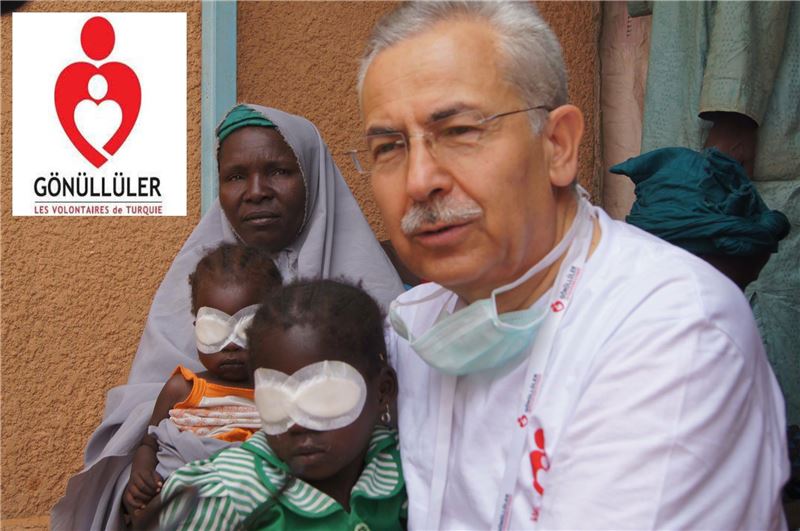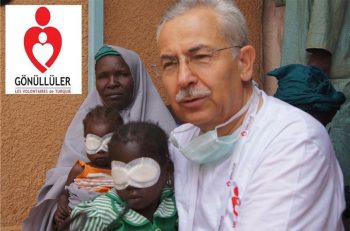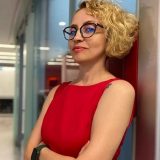“Civil Society Must Work In Coordination and Share Information: More Work is Possible with Less Cost!”

"In our file of Civil Society Pioneer, this week, our guest is İbrahim Ceylan, the President of the Volunteer Movement... The Volunteer Movement is a formation that has different NGOs and organizes health assistance to Africa as a main activity. İbrahim Ceylan points out the importance of the coordinated work and information sharing of civil society in the field of humanitarian aid and health and says "More Work is Possible with Less Cost."
How do you describe yourself?
We do professional business with an amateur spirit. Being a business person gives me an advantage but of course volunteering is at the forefront. If you’re not doing this for a price, you’re a volunteer. I have never done it out of financial expectation. I’m the head of the Volunteer Movement. I have been working as the head for about 15 years.
Why did you want to take part in the civil field?
We have a foundation culture that comes from my family. I’ve been in business for 47 years. The late Özal encouraged us to open up abroad. After the 1999 earthquake and what happened in Aceh, we chose to be in Africa. When we went to Africa, we saw that everything was needed. Wherever you look at in Africa, there is desperation and absence. By choosing a country in Africa in 2005, we wanted to bring health care there, and we decided in Niger.
Volunteer Movement is A Multi-Stakeholder Formation
Can you tell me about the activities of the Volunteer Movement?
The volunteer movement is a multi-stakeholder movement supported by the public institutions. We have been delivering health care to Niger since 2005. You can’t afford it with the private hospital doctors and pay for it on your own. Volunteering is an essential here. Medics think,” we should give the zakat of our profession.” We’re taking paramedics who are volunteer. Because private hospitals employ minimum number of doctors so we take doctors from the public hospitals to Africa. Every year, we carry out 15-day trip and volunteering activities with the support of the government. The Ministry of Health assigns some doctors who work in the public sector. A volunteer doctor comes to Niger with us, as if he/she is on paid leave, without spending her annual leave, with a continued salary, but without a per diem. At the end of 15 days, we are the first in the world for 8 years as the Volunteers Movement, with the number of operations performed per day. The success to have public support and to run this movement with stakeholders. This is a model project and it has been going on for 15 years. We want it to be an example both in the world and in Turkey. TIKA has an aid budget for Africa. We’re getting TİKA’s support. Turkish Airlines (THY) covers travel expenses of the doctors without additional charges.
What is the mission of the Volunteer Movement?
Once you’re doing something right and transparent, people will find you. Bringing people together without taking into consideration of their views and being useful to people… This is needed everywhere. We did not institutionalize the Volunteer Movement as an association. Our association is BISEK and Kutup Yıldızı. Instead of being an association, we have been going to Africa with the name of Volunteers Movement since 2005 to bring health aid to Africa by meeting with many associations. We choose doctors according to their merits. We have been to Niger 26 times and generally we meet with most of the people at the airport for the first time. Their religious belief, life view or everything can be different. We’re just looking at Merit. We only focus on the health of people. We don’t distribute any brochures, books and etc. and we don’t talk politics. We only focus on our work. For this reason, we have been sustainable for 15 years. The volunteers focus only on the health care. People who don’t get together in a social life can meet there. We have been making these warnings from the very beginning in order to prevent any further segregation. And when we get back, we keep in touch. We have taken about 9 thousand volunteers.
Why do you prefer to be in Niger?
Especially an NGO that intends to provide health assistance to Africa should choose a country. If you go to different countries in the short term and constantly. They are not known, they are forgotten, and it becomes difficult to report. There is no sustainable process for that country. Therefore, the reason we chose Niger is because in that region, in Central Africa, not near the sea coast, 80% of Niger is desert, only 3% is arable land. For this reason, we chose Niger as the center because it is the poorest country in the middle of Africa. In general, NGOs do all their activities in capitals. We don’t go to capitals. It is not meaningful to do this health work in the capital because there are a certain number of doctors, even if there are not enough in the Capitals, and there is no need for health care. That’s why we chose a region in Niger that is far from the capital and has no hospitals near it. We decided to settle there. Now we have a Turkish family that lives there all the time. Since a local person doesn’t have $20 or $30 for treatment, they have advanced diseases. We pay for the operations. Only in this area we have 9 thousand of cataracts, but it does not have an end, we cannot finish. Now we want to build hospitals so we can deliver more permanent health care in Africa and Niger.
“Amateur Spirit, Professional Work”
How have you made the Volunteer Movement sustainable since 2005 with a supreme identity?
We work professionally in an amateur spirit. We’re not in financial trouble and we do as much as we can. We run the Volunteer Movement with 3 employees without getting out of control, growing as much as our capacity, creating an impact. We work with other outgoing associations to help countries where we cannot go directly; for example, we bought and sent boots to Idlib through an other association or we give medical devices. If we have excess supplies, we give them through other NGOs. And we do our business from a corporate perspective. Institutionalism has benefits both in terms of trust in donors and in terms of working well with NGOs. In this way, the government can control your work in a measurable way. After every trip we make to Niger, we report our activities to the embassy, the Ministry of Health, the Ministry of Foreign Affairs and TIKA. In this way, a civil society activity becomes institutional, measurable and controllable.
It’s important to be trusted. After July 15, there was a loss of trust in civil society but donations to us are still growing every day. If you manage someone else’s money, you need to present the activities you conduct to your donors visually and as documents. So far, 16 different associations have come with the Volunteer Movement and our door is open to everyone. We make a call to the associations saying “we are thinking of going to Africa on the following dates”. The associations that match the dates and want to join, are coming. Each and every time different associations come.
Is there a political dimension to the fact that the state in Africa supports you with TIKA, the Ministry of Health and Turkish airlines, such as contributing to Turkey’s soft power?
Yes, of course. There are at least 2 Turkish associations in all of Africa and in every country. If we have an embassy in a country, we can do business there. In the past, there was no Turkish Embassy in Africa. There are 14 Francophone countries in Africa, and France still has a lot of influence in those countries. It’s not easy to operate in countries like this. In addition, THY has greatly increased our projection. Being able to go directly to African countries has contributed to our growth. Being able to fly directly to a country to take medical supplies has increased the service we are providing. Because even 1 day in Africa is very valuable. You can touch the lives of many people in one day and you can treat them.
Turkish NGOs’ Work in Africa…
What have you and NGOs like you achieved in Turkey and Africa? Changed what?
Corporate associations and those like us who conduct civil society activities in the form of volunteers are different, of course… We work in good projects as much as we can. For the last 10 years, Turkey has been doing permanent work especially in Africa and in disasters such as disasters in Malaysia and Indonesia. In terms of Turkey’s mission, for example, in Niger, you see this pay off when you carry out civil society activities institutionally. If the Prime Minister of Niger calls us and values our views, we see this as a success in terms of the aid and gains made by Turkey in Niger. They welcome us not as an institution or an association, but as “the Turks have arrived”. As Turkey, we are already the world leader in humanitarian aid. We see this as Turkey’s success.
Would you advise people to join civil society? Why?
People who have a concern with civil society are interested. There is anxiety and gratuitous help for someone else in the civilian area. We, as Turkey, are already very successful in this regard. Nearly all international NGOs providing health care in Africa are missionaries. They spend 25% of their resources on missionary work in the field. As a volunteer movement, we are doing what we are doing right that we have been able to go to Africa with doctors from public hospitals for 13 years. Many doctors and nurses want to join our visits to Africa. A lot of paramedics want to go to Africa and do something for people. Those who carry such concerns are already participating in civil society activities.
What would you say if I asked you to critically evaluate the civil society in Turkey?
The understanding of “make it small, let it be mine” harms the donors a lot. Because in civil society, you manage the money that someone else earns. You have to spend on someone else’s custody. We have to be united and we have to exchange ideas. If you want to bring aid to a country abroad, you will have to spend more if you do it as an NGO. For example, you need to spend at least 10 thousand to do something in Niger. If you want to do a charity activity in Niger and don’t ask us about it as a movement that has experience there for years, you are under the blame. Everyone in Turkey is establishing an association and everyone wants to be a president. It’s easy, but you have to do it sustainably. This has a cost. For this reason, NGOs should work in coordination with each other and share information between them. But they don’t usually do that. There are few NGOs that do.
If one of the associations in the volunteer movement goes somewhere for a charity event, we give that association a certain budget so NGO represents us there. For example, if an NGO is going to Chad for mass circumcision, we also participate in the activities of another association by preparing a banner. This saves money. We can do a lot of work with less cost by working more together with cooperation. This is badly needed. NGOs in Turkey are not very ready for this, but hopefully it will happen in time.
Do the Volunteer Movement have any new projects? Can you tell us?
We’re building our own boutique hospital. There’s a shortage of human resources in Africa. Therefore, we give a lot of weight to training. In the field of education, we establish workshops with 6 classrooms. They live mostly on the border of Nigeria, the other sides are desert. We will give textile trainings in these workshops. We’ll teach some professions like auto repair. We’re building an orphanage for girls. We’ll raise 36 girls with high intelligence. We strive to be sustainable. We’re building a beautiful orphanage. We are planning to study the primary school there, and to teach the university in Turkey. In Africa, women are very oppressed. Those who have studied also run the state. We run better projects with female politicians than with male politicians.
“There Is A Lot Of Need In Africa”
As the chairman of the Volunteer Movement, what is your message to those who want to support you and to civil society?
The health in Turkey is at a very successful level. The polynicity service is very good when it comes to emergency response. It’s very difficult for the state to handle this expense because medical devices are so expensive. The medical care is also very expensive… Health care is badly needed in Africa. The Congenital cataracts can be treated for $20, but she/he never went to the doctor until the age of 38… There are such patients in other regions as well. There are 200 thousand female patients in Niger who can’t hold their urine. We need to operate them. Among these people, there are very young mothers who are 13-14 years old, there are 2 million patients under the Sahara.. There are people in Africa drinking muddy water. The clean water is badly needed. Assistance for the water well is very important. There are very few countries and institutions like us that will provide health care. The Cubans come to Africa, but they approach the issue politically. And the Europeans are sending more inexperienced medics. There are people living in Africa suffering a lot. There is so much to do in Africa and so much need. Somebody has to do it. They can fill out the Volunteer Form on our Volunteer Movement website and support us.
What message do you want to give young people?
We’ve been in Africa for 15 years. Now we have to raise young people for this business. We have volunteers who donate a large amount. We include medical students every time we travel. We also have a movement of young volunteers and they also have logos. We are conducting separate studies on them. Civil society and NGOs that do not care about youth cannot stand. We have to involve young people in these activities, we attach great importance to this.



Bizi Takip Edin